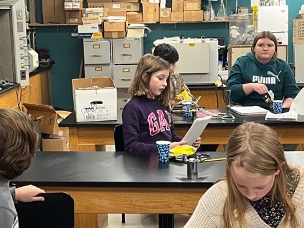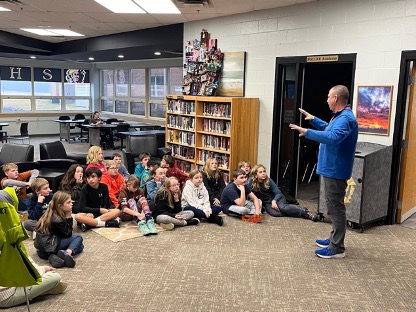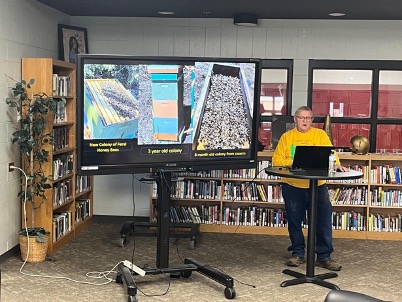
Club members keep a journal of their experiences and write down the highlights. Some describe these events with words, others with sketches. Periodically they are asked to share their writing with the group.
Shown above is a session in Mr. Reames’s lab where the students learned about daphnia, a freshwater crustacean that plays a vital role in aquatic food chains. During the session, the participants learned how to use microscopes and to measure daphnia heart rate in order to understand the effect of toxins on the organisms.

Above, students hear from Steve Baker, NRCS (Natural Resources Conservation Service) State Soil Scientist, about soils, their formation, and the geologic history of Ohio. Mr. Baker explained that understanding the glacial history and mapping helps planners and scientists better advise where building and development should or should not take place.

The Benjamin Logan Environmental Club welcomed Dwight Wells, master beekeeper and researcher to a recent meeting. Dwight shared with the group the life patterns of the honeybee and why they are so important to the food supply of the U. S. and the world. While honeybees are far from being the only pollinators, they do pollinate over 1/3 of the crops that we eat; crops which are valued well over $14 billion annually. Honeybees are in a huge decline across the United States impacted by insecticides, pests such as mites, and loss of habitat. Mr. Wells’s research has shown that local feral bee populations are much better suited to facing these challenges.
These programs are through the volunteer efforts of teachers Bruce Smith, Spencer Reams and Ryan Kerns along with Bob Stoll from the Logan County Land Trust
All of these programs and more are sponsored and supported through the Logan County Land Trust whose mission is to promote the preservation and wise use of the lands of Logan County.

